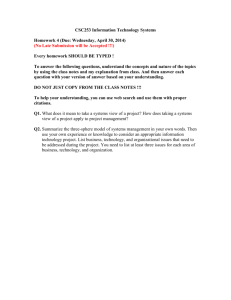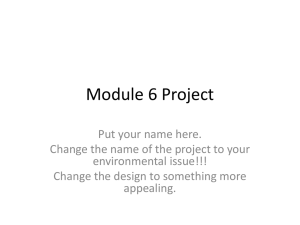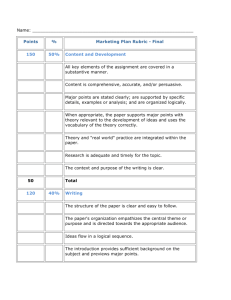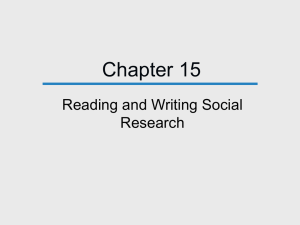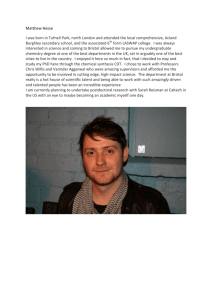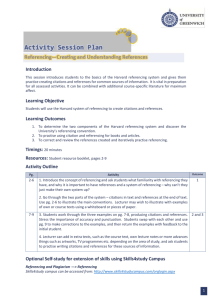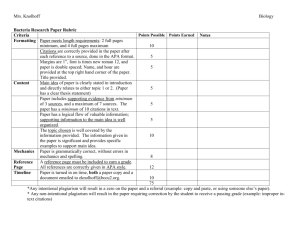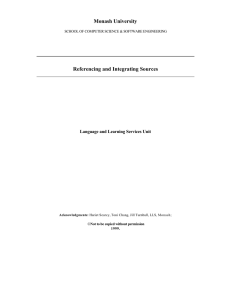The Library and your Literature Review
advertisement
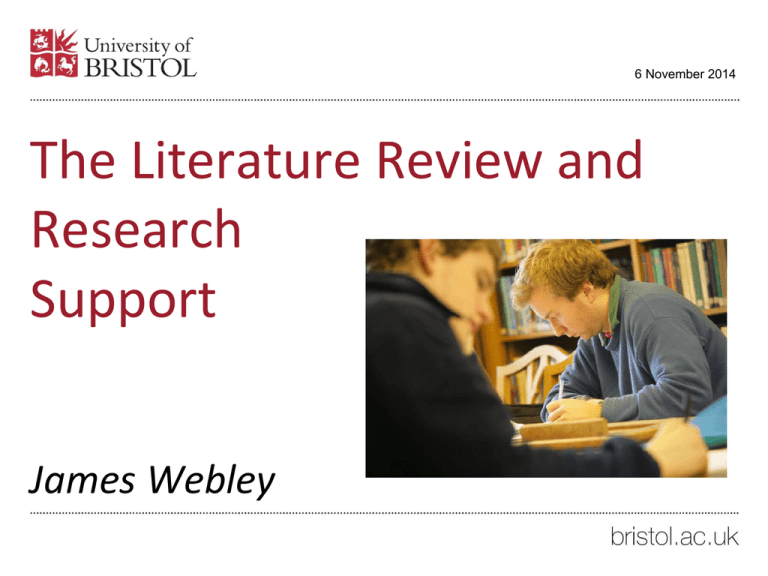
6 November 2014 The Literature Review and Research Support James Webley 6 November 2014 Today’s talk: The importance of the literature review. Outline the research/literature review process. Where to go to find academic resources. Referencing and software to help (EndNote). Good research habits. Further help and advice. 6 November 2014 Why review? “If I have seen further it is only by standing on the shoulders of giants.” Isaac Newton, 1676 To make sure you are not re-inventing the wheel. Demonstrate how your work is situated within, builds upon, departs from earlier publications. It shows that you are a member of your chosen field. Generally agreed that a researcher should have knowledge of previous work on a topic before undertaking any investigation. Past studies can contribute to the design of good new studies. 6 November 2014 Research/LR process Starting out Locating and accessing material Search techniques Reviewing and evaluating your results Writing up Referencing (paraphrasing, summarising, quoting) Final Checklist 6 November 2014 Starting out Decide your topic and devise a research question. Books/ebooks (recommended textbooks), review articles, web searches, patents, Wikipedia, newspapers, online reports, previous projects/dissertations, Supervisor, Subject Librarian. Build up key concepts and words relevant to your topic. Identify phrases. Remember variant spellings (e.g. US and English), different meanings, synonyms etc. 6 November 2014 Locating material Select appropriate resources and search for a variety of materials – Print and online, primary and secondary. ‘Library Search’ for books and journals (print and E) Subject Databases, Patents, Standards, Ejournals and websites: For one-stop-shop: ‘Library Aerospace Bristol’ Search engines – Government /Inter-governmental and corporate reports, open access material. Follow a ‘research trail’ – bibliographies, references, citations. Find/access material not held at Bristol - COPAC/ILL /SCONUL/Subject Lib 6 November 2014 Accessing material Access based on IP address, so if off-campus or using your own PC/Laptop… 1. University username and password (Shibboleth/UK Federation) 2.Remote Student Desktop or Off-Site Proxy …and if we really don’t have access to an article you need then request via the ‘ILL requests’ link on ‘Library Search’. The article will be emailed direct to your desktop. Email lucy.wilkins@bristol.ac.uk for voucher/payment. 6 November 2014 Search Techniques Use search tools in databases • • • • • Boolean (AND, OR) Truncation - * (e.g. dynamic* = dynamics, dynamical, dynamically) Wildcard - ? (e.g. organi?ation = organisation, organization) Search within results and citation searches Refine by year, type of publication, subject etc. and search engines: • Phrase searching – “Machine learning” • Limit by file type, date, language etc. • Limit by domain - .org, .ac.uk, .eu, .co.uk/.com, .gov.uk 6 November 2014 Reviewing/Evaluating results Read the abstract – is it relevant? – Coverage Is it free of errors backed up by reliable sources? - Accuracy Who wrote it? Expert? Academic? Corporation? – Authority Is it cited, peer reviewed/edited – Academic authority Bias? Commercial interest? - Objectivity When was it published? - Currency 6 November 2014 Writing up Structure the review and impose some order on your findings (Synthesis). Link the ideas in your review. Cite – acknowledge your sources. Store, manage and share references as you go. 6 November 2014 Structure the review • Introduction General description, accepted knowledge, present information that is widely known. Clarify the scope and organisation of the review. • Body Synthesise the literature (your findings). • • Conclusion Make a point (opinion) and guide your reader to see the need for your research and to show you understand the field. 6 November 2014 Imposing order on the literature Chronological (publication date/development) Provenance (country of origin) Sub-discipline within a larger field (thematic) Perspective (writer’s attitude - positive, negative, neutral) Genre (type of publication - book, article, website, blog etc.) 6 November 2014 Linking the literature Metadiscourse Citing and Referencing Citation type and tense (grammar) Reporting verbs (linking words) 6 November 2014 Metadiscourse …do not add specific content, but are intended to reveal organisation and help readers through your text… The first part of this review traces the early development of fibre-reinforced polymers. The negative aspect of FRPs in the civil infrastructure will be taken up in the next section. This section examines studies in the use of FRPs in bridge construction. …builds up a relationship with your reader, engages them. 6 November 2014 Citing and Referencing Paraphrasing • Restating a specific point or points from another work Summarising • Conveying the main message of a source Quoting • Directly re-using the words and structure (verbatim) from a source. All the above require citations and references in your work your own opinions, results from your own surveys/experiments, common knowledge do not. – writing 6 November 2014 Citing and Referencing Strategies for paraphrasing and summarising: • Find key points and the relationships between them – do you understand? • Rearrange the key points • Use different linking phrases/verbs, e.g. although, however, due to, caused by etc. • Use synonyms and change parts of speech where possible (plain English?). • Additions/deletions 6 November 2014 Citations (type) Integral citations (Author prominent) • According to Jay et al. (2006) about 25% of the labour force in industrialised countries… • Rogers & Mayhew (1992) and Keenan (1941) discussed the relative importance of thermodynamics in their respective seminal works… Non-integral citations (Research prominent) • Research indicates that around 25% of the workforce in industrialised countries…(Jay et al., 2006) • The relative importance of thermodynamics has been clearly stated in numerous seminal works (Rogers & Mayhew, 1992; Keenan, 1941) 6 November 2014 Citations (tense) Past tense • Arslan (2007) investigated the performance of biodiesel as a diesel engine fuel. • Biodiesel was shown to have promise as an alternative to regular diesel (Arslan, 2007). Present Perfect • The potential of biodiesel as an alternative to regular diesel has been widely investigated (Arslan, 2007) • Many researchers have investigated the potential of biodiesel as an alternative to regular diesel Arslan, 2007; Gardner, 2009) Present • The scarcity of petroleum is making renewable energy resources increasingly attractive (Hargreaves, 2007) 6 November 2014 Reporting verbs Propose Use Discuss Investigate Describe Show Publish Report Give Develop Study Expand 6 November 2014 Literature Review Checklist Have you shown a clear understanding of the topic? Have a variety of sources been used? Journals, books, websites, government reports etc. Have you appropriately linked your various sources? Have you described the literature in an original manner and cited so that questions of plagiarism will not arise? Have you stated clear conclusions about previous research? Don’t leave your work open to questions like: “What is your evidence here?”, “Who says so?”, “What makes you think so?” 6 November 2014 Referencing EndNote Basic: Free service that helps with collecting, storing, and sharing references. Automatically creates bibliographies and citations within coursework. www.myendnoteweb.com 6 November 2014 Good research habits: An awareness of the search tools available to you. Google: ‘Library Aerospace Bristol’ A knowledge of search techniques and how to refine/sort/combine your searches. Critically evaluate the resources you find. Use appropriate tools to manage your information. 6 November 2014 For help and advice… Subject Enquiries lucy.wilkins@bristol.ac.uk ‘Library Aerospace Bristol’ @BristolUniLib
